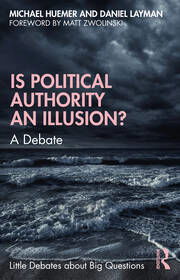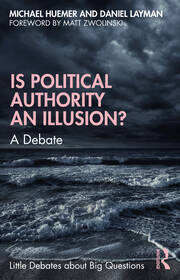Michael Huemer and Daniel Layman, Is Political Authority An Illusion? A Debate

By Walter Horn

Michael Huemer and Daniel Layman, Is Political Authority An Illusion? A Debate (Routledge, 2021)
When two or more scholars are to face off on some issue, I suppose it is best if they agree on some—though obviously not all—of the key issues they will be discussing. Perhaps the common ground will involve foundational matters and the disagreements will arise on what is claimed to follow from them. Or it may be the other way round: the areas of agreement may appear among the conclusions rather than the starting points or the manner in which it is believed those termini can be reached. Naturally, where there is little in the way of mutual understanding, such discussions can go spinning off into outer space because of wildly conflicting intuitions. Fortunately, there is just about the right amount of background agreement in the debate that constitutes The Illusion of Governmental Authority, for while the contestants, philosophers Michael Huemer and Daniel Layman, find many things to argue about, they do agree on all of the following matters:
- There are moral truths which most of us know and all of us should know.
- Some of these truths follow from the fact that people have natural rights to such things as the integrity of their persons and the freedom to engage in an almost unlimited number of types activities that do not infringe on the ability of others to enjoy similar freedoms of their own.
- If a state has any proper function at all, it must somehow involve the “defining, adjudicating, and enforcing of rights.”
- Natural rights are sometimes permissibly violable. According to Huemer, for example, it might be acceptable to murder an innocent person “to prevent World War III.”
- Not only do people have the right to disobey laws that go beyond government’s proper scope, they may have the duty to disobey those laws that are particularly heinous.
- Many millions of people around the world—and a particularly high proportion of those living in (at least arguably) democratic countries—agree that obeying their governments’ commands is morally obligatory. (Layman thinks these millions are right in that belief, Huemer thinks they’re wrong.)
What the debaters believe can be correctly inferred from this package of premises is an entirely different matter, however. One of the reasons for this downstream separation seems to me to follow from the fact that Huemer takes the moral truths referenced in (1) to be common sense items generally knowable by all those who are both reasonably intelligent and sufficiently attentive, while Layman attempts to provide an equalitarian basis for his ethics that he derives from his readings of Locke and Kant. So, for example, both men think we can discern the ethical truth that no self-appointed vigilante who “kidnaps and imprisons” those who do bad things and then requires payment from everyone in the neighborhood for such “protective services,” needs to be obeyed. But while Huemer’s intuitions lead him to believe that there’s nothing relevantly different about government officials who get up to the same sorts of alleged mischief when they arrest people, Layman’s Kantianism convinces him that we should separate out the actors and rules which, because of their essential importance to the protection and enforcement of the equal rights of every person within the jurisdiction, we are morally obligated to obey. He likens the peculiar standing that states have to the uniqueness of parental powers over young children: “If there is genuine state authority, it will be one-of-a-kind; it will rest on grounds distinct from those that support any other kind of authority, and it will exist only within citizen-state relationships.” And while Huemer takes governments to be mostly evildoers who are involved in activities that would be better handled by private firms even when they happen to do something worthwhile, Layman finds democratic polities to be irreplaceable protectors of the equal rights of their constituents. On his view, no one is really free unless there is a democratic government in effect that is both capable and willing to enforce prohibitions against transgressions of our rights.
Thus, while Huemer suggests that it is safer to trust attentive sages than public officials regarding what we are obliged, permitted or must not do at any given time, Layman argues that we are generally required to rely on the results of deliberative democratic decision-making. On his view, when people differ, as they surely will on such matters as appropriate tax rates or the proper way to regulate pharmaceuticals, we should generally (although not always!) defer to the determinations of voters, legislatures, bureaucracies and courts, rather than depend on the moral intuitions of Huemer and his academic peers. While both men thus think that justice requires that we sometimes disobey an egregious government edict, they disagree about what should be done when this happens. Layman thinks any civil disobedience should be performed out in the open, with dissenters publicly accepting whatever punishments are doled out, while Huemer puts more weight on the likely consequences for the nonconformer than on the effect of the action upon other citizens. On his view, if a law is unjust, it is perfectly acceptable to defy it in secret.
It is interesting to note that (6), the final entry in my above list of agreed-upon items, is an empirical claim. And, presumably, it is the proposition that generates most of the excitement connected with a book on the question of whether government authority is illusory. But…is (6) true? I doubt it. It seems to me to be much more likely that both Layman and Huemer are wrong to believe that very many people around the world think that what provides the “force” behind governmental edicts is an ethical matter. It seems to me much more likely that nearly everyone understands that very little of the authority associated with governmental commands is a matter of morality rather than of might. No doubt, when we get our tax bills, we may not like the amount we are required to pay; we may even find it to impose what we take to be an immoral burden. Similarly, if we find ourselves being “kidnapped and imprisoned” by uniformed individuals, we may suspect not only that the threatening individuals are phonies but that the basis on which we are being hauled away is grossly unfair. But most of us have no illusion that the “force” either of the tax bill or the Kafkaesque visit is connected with whether the commands accord with any abstract conception of morality. Justice here, even for a Joseph K, is a purely procedural matter.
With what crime am I being charged? Does it reflect some actual law? Who is making this accusation? Did I actually violate the relevant law? Are these “uniformed kidnappers” legitimate agents of the state or imposters? And successful resistance is generally understood by most of us to be a function of our ability to convince people, not that some law is immoral, but that some required procedure has been contravened. Indeed, I agree with both Huemer and Layman that any fact making the “kidnapper” an authentic officer of a court rather than a costumed fake is insufficient to ensure that either the deliverer of the punishment or the punishment itself is morally justified. My demurral stems from the fact that I doubt that very many people believe that ethical judgement to be important—except to legislatures or courts that are involved with the review of the criminal code or process requirements. That is, most people do not seem to me to be guilty of confusing morality with what the early 19 th Century utilitarian John Austin called “positive law.” And that is just the confusion that I think both philosophers here make.
Austin did not himself deny the existence of moral truths, but a more skeptical type might start right off by denying (1). This theorist might not find much to prefer between Huemer’s claims regarding the absence of obligations to government when a particular tax rate or pharmaceutical regulation is “wrong,” and Layman’s view that our obligation to obey democratically-produced laws is, in the final analysis, a function of whether these laws fall within some range of moral reasonableness. For the latter assessment also requires meeting some Platonic standard (presumably to be applied by the wise). To one who thinks “the people”—rather than any eternal truths—are sovereign, the differences between the claims of these two moralists may seem insubstantial and unimportant.
It should be noted, however, that if I’m right about the falsity of (6), Huemer may not mind too much. Although he takes the masses usually to be wrong about nearly everything, he will surely be contented with their agreement with him regarding the illusoriness of governmental authority as he understands that term. Governments would, he thinks, have real moral authority only if they were like a person in a lifeboat who forces everyone to bail because equal distribution of this work seems a fair way to prevent every passenger from dying. But Huemer claims that even the most democratic governments rarely play such roles. He takes them to be much more akin to a group of restaurant diners who decide, by majority vote, who among them is required to pay the entire bill. What he thinks we should generally expect from majorities is the issuance and subsequent attempted enforcement of such silly—but sometimes extremely harmful—commands.
For his part, Layman wants to show that we are morally obligated to obey legitimate governments, so he attempts to specify how (at least democratic) regimes are (and are not) similar to Huemer’s neighborhood vigilantes, lifeboat autocrats, and tyrannous restaurant majorities. This is obviously a crucial matter in the debate between these two moral realists, but there seem to me an inordinate number of pages (about thirty) spent on a couple of sets of burden tennis here. Each philosopher accuses the other of begging the question as to whether (good) governments are “exceptional”—i.e., different from the principal players in Huemer’s folksy analogies. When Layman serves, he claims that he has demonstrated that governmental authority, because of its sui generis rights-protecting characteristics, is as unique as parental authority. When Huemer returns service, he insists that he is arguing for no more than the obvious supervenience of moral properties on physical characteristics. And he argues that this supervenience requires that if Layman thinks one of these analogies is no good, he must provide the relevant physical differences: he cannot simply insist on any claimed uniqueness of the moral results. Sadly, there is no umpire to point out that whoever is right about “exceptionalism,” there is roughly the same amount of moral content to the “obligations” we have to our rulers as there is to the obligations of toddlers to their parents. In both cases, obedience is simply inescapable (as well, presumably, as highly productive of wellbeing). Thus, the morality of such deference is strictly a peripheral matter.
Layman’s main contention in the book is that “governments are authoritative to the extent that they secure equal liberty within rights by comprehensively defining, adjudicating, and enforcing rights through institutions subject to equal basic accountability.” Huemer points out that he can require his democratic diners to be as accountable as Layman likes (and as deliberative too!) without any moral obligation arising from their decision-making. I agree with him about that, but the entire discussion seems to me both to misunderstand what democracy is: the best way to determine what a group wants and put them in charge of getting it , and what it is that makes governmental commands authoritative: power and procedure . A majority can no more make something morally good than it can make 2 + 2 = 5 or snow purple. But values are not facts. What democratic arrangements can uniquely accomplish is the aggregation of individual choices in a manner that allows for real self-government. In the world of wellbeing calculations, what the majority wants is not just relevant, but dispositive. Thus, if a properly democratic polity wanted dinner tabs always to be paid in the fashion Huemer describes, that procedure might be required whether or not it is “ethical.” I point out, however, that, to my knowledge anyways, no polity anywhere has ever wanted to put in place any procedure remotely resembling the Huemer bar tab plan, and I sincerely doubt any ever will.
As said above, Layman agrees with Austin in finding an essential difference between an authentic bailiff and a costumed imposter. But he does not want to join the 19 th Century consequentialist in denying that the “shoulds” and “musts” emanating from governmental commands are moral terms. While an Austinian might take the differences between private and official acts to vary according to the prudential value they produce,it is important to Layman to retain the ethical aspect of these obligations. It is not that either he or Huemer would deny that it may well be in someone’s personal interest to do what both the real and the phony policeman insists upon: after all, if their guns are lethal, either legitimate or fake “lawmen” can kill anyone who resists arrest. But both philosophers would claim that authentic governmental authority requires more than just the acknowledgement of government power and the reasonableness of personal fear among those who are bound to obey. I agree, but probability estimates of wellbeing don’t stop at considerations of immediate personal harm. Layman makes much of what he takes to be a necessary accountability to its citizenry of any respect-worthy government. I agree with that as well, but it seems to me to be another clue that we are in the realm of prudential rather than ethical values. If a group wants some of its members to take this or that action, surely it is in that group’s interest to ensure that this designated subgroup is accountable to the whole—but there is no good reason to assume that such accountability be deemed an ethical requirement. After all there are various types of non-ethical “shoulds.” The debate between Layman and Huemer regarding whether governments actually are accountable to any particular populace could continue, but it need not involve any ethical questions at all. For example, one might rebut Huemer’s repeated claims that no one can ever successfully hold a government to account for its actions or omissions by simply pointing out that there have been many criminal judgements or and civil recoveries involving police misconduct.Indeed, quite a few of the arguments between these philosophers would be simplified and clarified if moved from an ethical to a prudential plain and considered with respect to both individual and group outcomes.
Take the two philosophers’ stances on “jury nullification.” Huemer, an anarcho-capitalist with a customary aversion to governments, is keen to find ways to defy what he takes to be tyrannical masters. Layman, a compassionate democrat, is in search of any manner in which the unfortunate—women, minorities, those too poor for decent legal assistance, etc.—can be afforded a helping hand. These disparate attitudes result in their joint defense of a position wherein jurors have a moral obligation to try to hang any jury on which they sit whenever they believe the operative law is unjust. If this means lying when interviewed for one’s fittingness to be on a panel or ignoring the jury instructions, so be it. They agree on the consequentialism here: we may lie or otherwise deceive to prevent a greater evil from occurring. But, as might be expected, while Huemer feels no hesitancy whatever in substituting his judgment for applicable statutory and case law, no matter how well-established, Layman seems apologetic when he finds that his deeply felt duty to help or prevent harm outweighs his general obligations to his reasonably democratic government. However, just as in the matter of civil disobedience generally, this debate should be understood to regard what consequences will be best for the individual or group, rather than who has the morals right, which philosopher makes the better angel.
Let me conclude by suggesting an additional basis for the wide divergences to be found among many of the conclusions reached by these two moralists. Huemer seems to have found little that is remarkable in what he takes to have been produced by governmental activity. Cities, bodies of case law, public universities, museums, parks, prisons, legislatures—he thinks all might have been developed more efficiently and to even greater heights by private firms having no pretensions to special, extra-contractual powers. Layman disagrees; he finds much that is precious in what has been produced by public institutions. While he sees the potential for even greater benefits, he denies that our world could be nearly as good as it is without prior government industry, particularly in the area of rights-protections. On my own view, the vision of both men is distorted by a failure to recognize that the aggregated value of assistances that are unlikely to be afforded by non-public entities can sometimes swamp even those goods made in the interest of protecting rights. To paraphrase Everett Hall, maximizing individual freedom demands not merely protecting individual rights granted at birth, but an enormous organization of social effort not only to elevate educational opportunities and living standards but to help in the development of every aspect of human life.

About the Author
Walter Horn is a philosopher of politics and epistemology.
His 3:16 interview is here.